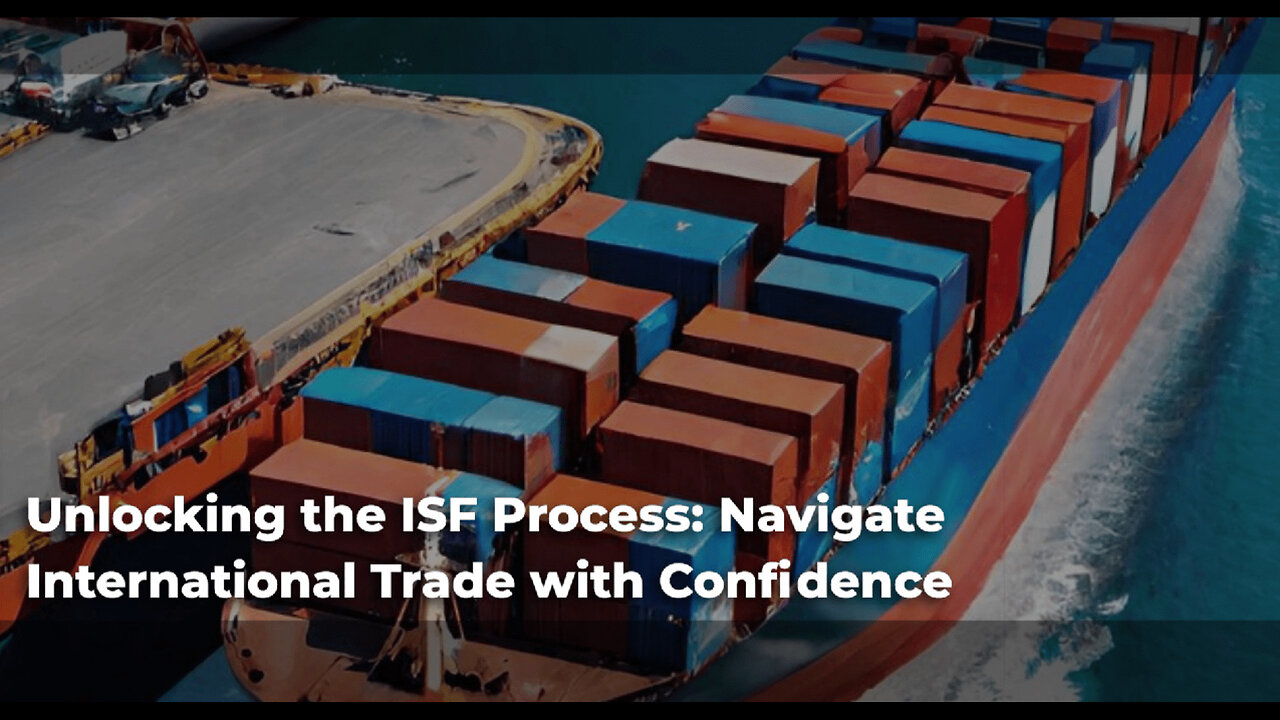Premium Only Content

Mastering the Importer Security Filing: A Guide for Smooth International Trade
License To Import // 323-578-6432 // file@licensetoimport.com // www.licensetoimport.com
In today's discussion, we dived deep into the Importer Security Filing (ISF) process, a crucial requirement for importers engaged in international trade. The ISF is a comprehensive filing submitted to the US Customs and Border Protection (CBP) to provide essential information about the shipment before it arrives in the country. It consists of three key elements, including the 10+2 information, the Master Bill of Lading, and the House Bill of Lading.
The 10+2 information is a combination of ten data elements provided by the importer and two data elements provided by the vessel operator. These details include seller and buyer information, country of origin, and container stuffing location. The Master Bill of Lading is the main document issued by the shipping line or consolidator, containing details about the vessel, ports, and consignee. The House Bill of Lading, issued by the freight forwarder or NVOCC, provides cargo-specific information and must be submitted at least 24 hours before the cargo leaves the origin country.
Moving on, we discussed the importance of customs bonds in the realm of customs brokerage. A customs bond is a financial guarantee that ensures the payment of duties, taxes, and fees to the government. It acts as insurance for the CBP, protecting them from potential losses if the importer fails to meet their obligations. Different types of customs bonds are available, including single-entry bonds for specific shipments, continuous bonds for multiple shipments within a year, and term bonds for a specified period.
Lastly, we emphasized the critical role of customs brokers in the ISF process. Acting as intermediaries between importers and the CBP, customs brokers ensure the accurate submission of required information and facilitate the smooth flow of goods through customs. Importers can rely on customs brokers' expertise to comply with regulations and avoid penalties or delays.
In conclusion, the Importer Security Filing process is a fundamental aspect of international trade, ensuring that the CBP has the necessary information to assess and manage potential risks associated with imported goods. By working closely with customs brokers and understanding the significance of customs bonds, importers can navigate the complexities of customs regulations efficiently. We hope this discussion has provided valuable insights into customs brokerage and the ISF process. If you found this information helpful, please consider subscribing to our channel for more insightful videos on international trade. Thank you for joining us, and until next time, safe and smooth importing!
#usimportbond #isfcustomsbroker #uscustomsclearing #isfentry
Video Disclaimer Here: This video is solely for education and is not endorsed by any US government agency.
0:06 - Importer Security Filing (ISF) process is essential for importers in international trade
0:24 - ISF provides vital information to U.S. Customs and Border Protection (CBP) before shipment arrival
0:49 - ISF has three key elements: 10+2 information, Master Bill of Lading, and House Bill of Lading
-
 2:08:01
2:08:01
The Quartering
3 hours agoElon Musk Has A MELTDOWN & Leaks DM's, Matt Walsh Vs OF Girls, & the WORST Video We've Ever Seen!
31.2K24 -
 44:54
44:54
Steve-O's Wild Ride! Podcast
3 hours agoMark Wahlberg Threatened To Beat Up Jackass Cast Member - Wild Ride #251
2751 -
 LIVE
LIVE
SIEFE
3 hours agoRED DEAD REDEMPTION 2 LIVE!
383 watching -
 1:16:43
1:16:43
Russell Brand
4 hours agoHollywood Hypocrisy and Fighting Corruption: Rob Schneider Speaks Out! – SF521
71K57 -
 7:17
7:17
Rethinking the Dollar
3 hours agoTrump's Crypto Reserve Plan Shocks Everyone
1731 -
 11:20
11:20
China Uncensored
5 hours agoRedNote: Americans Flock to Chinese App Ahead of TikTok Ban
9104 -
 1:58:03
1:58:03
The Charlie Kirk Show
3 hours agoConfirmation Marathon: Day 3 | Sen. Scott, Plume | 1.16.2025
102K27 -
 2:54:51
2:54:51
The Dana Show with Dana Loesch
3 hours agoWORST FAREWELL SPEECH IN HISTORY | The Dana Show LIVE On Rumble!
17.6K3 -
 1:06:47
1:06:47
TheAlecLaceShow
5 hours agoGuests: Senator Steve Daines & FBI Whistleblower Steve Friend | Biden Farewell | The Alec Lace Show
16.2K -
 1:00:12
1:00:12
The Dan Bongino Show
6 hours agoBiden Is Destroying The Country On His Way Out (Ep. 2402) - 01/16/2025
644K1.36K